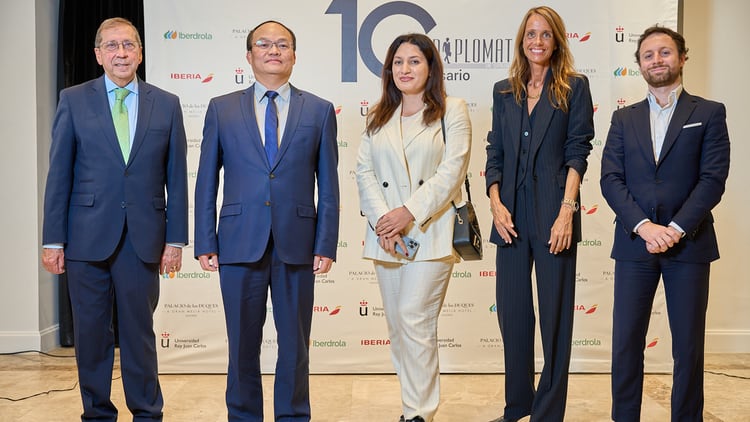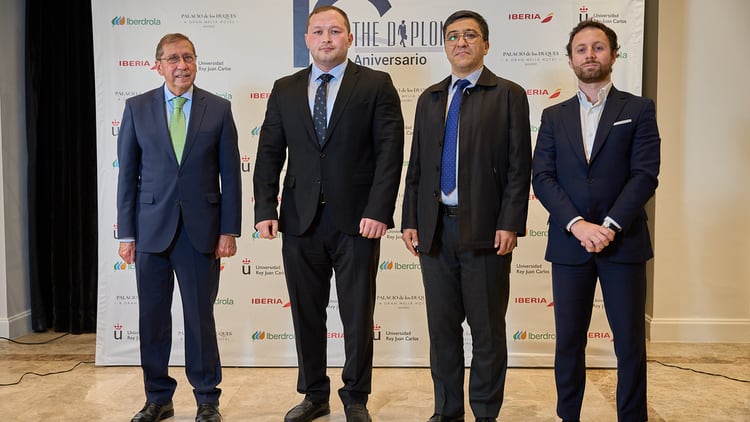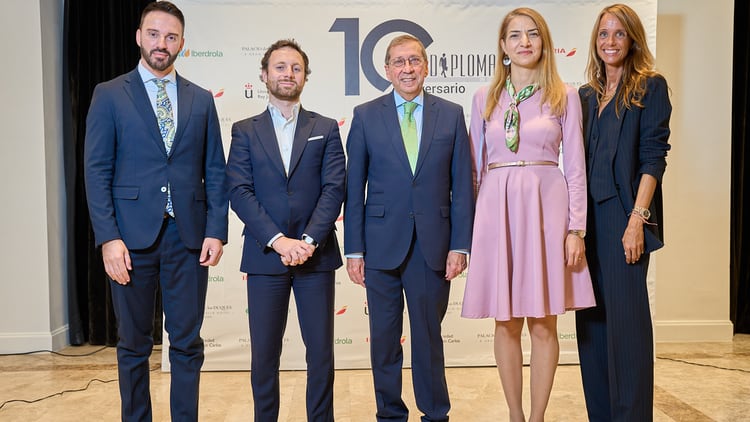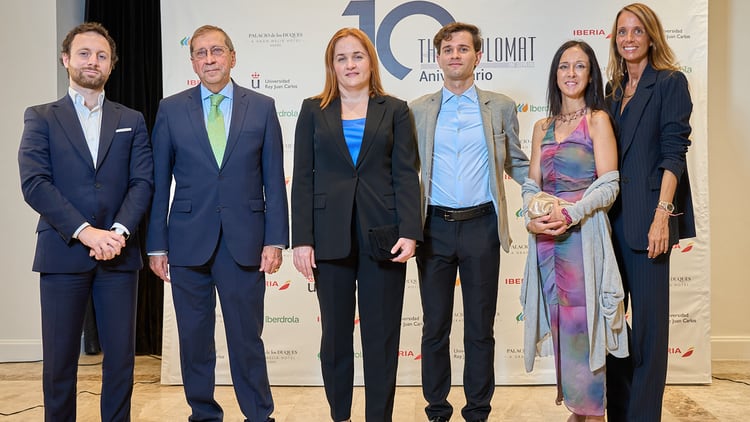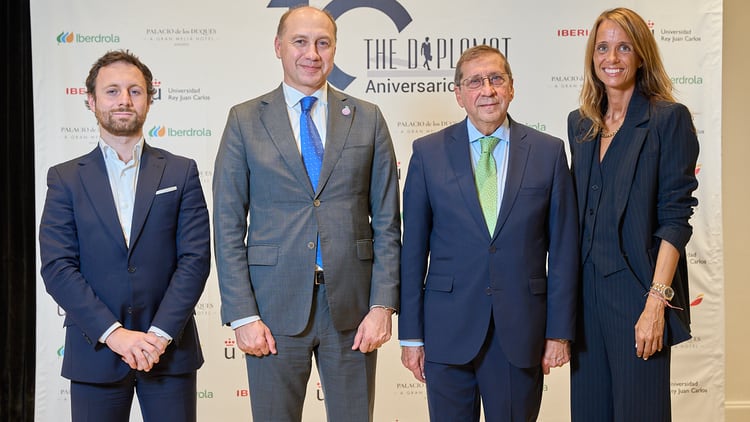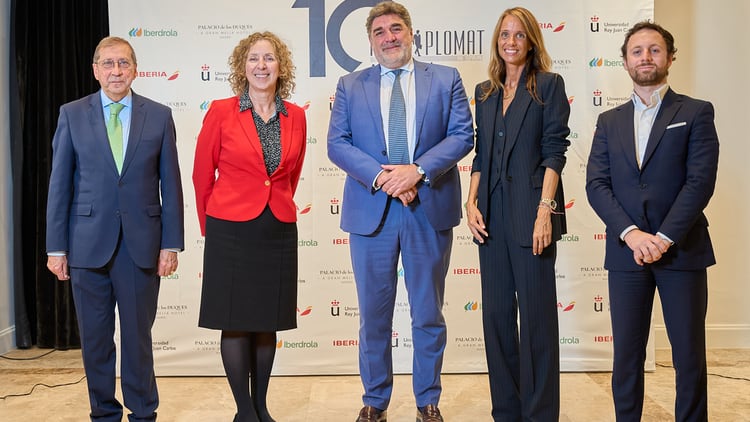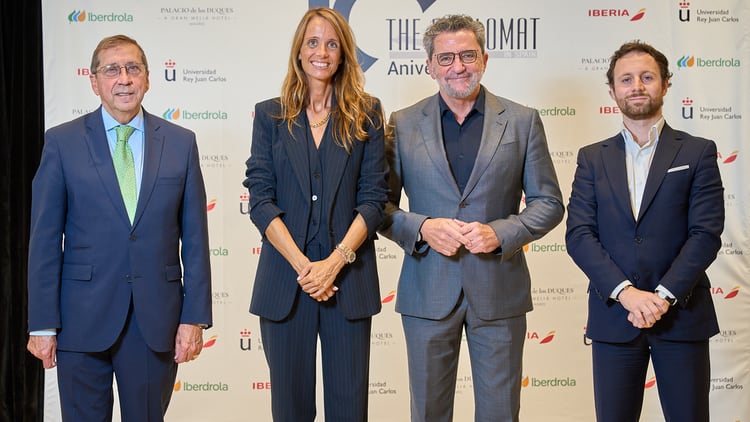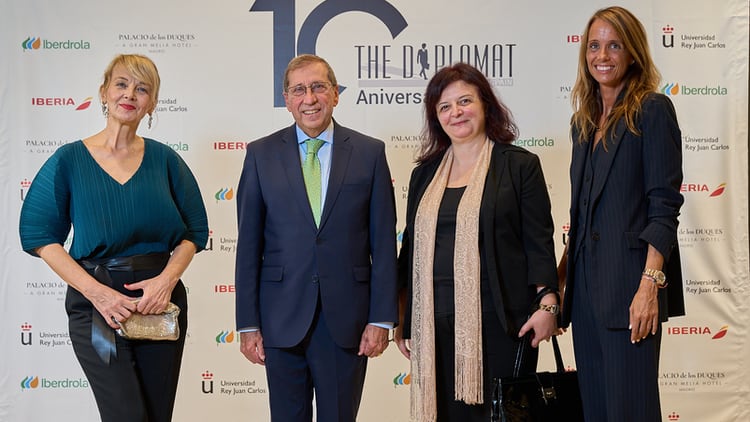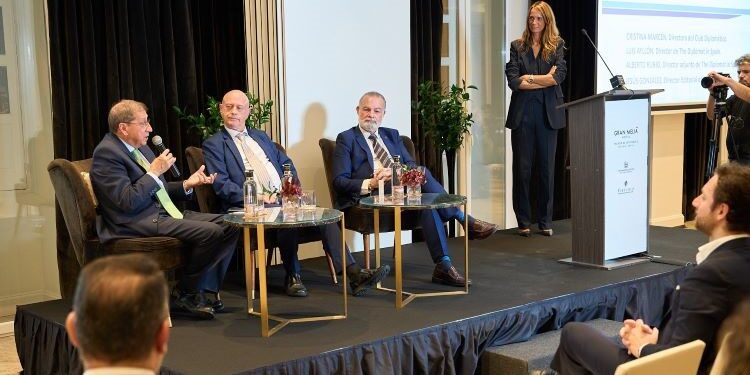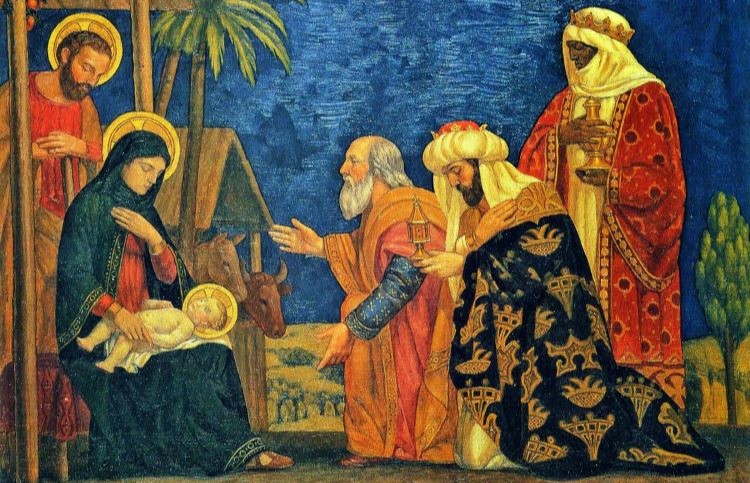Eduardo González
Representatives of thirty Embassies accredited in Spain and personalities linked to Foreign Action and diplomatic information in our country attended this Monday, at the Hotel Palacio de los Duques Gran Meliá in Madrid, the commemorative cocktail party for the tenth anniversary of The Diplomat in Spain, in which the beginnings were reviewed (that “madness”, in the words of its deputy director, Alberto Rubio), the challenges and the editorial and professional career of our newspaper, currently incorporated into the Prestomedia Group.
Specifically, the event was attended (through their ambassadors or other representatives) by the Embassies of Andorra, Armenia, Austria, Bosnia and Herzegovina, Brazil, Colombia, Cuba, Slovakia, Greece, Haiti, Honduras, Indonesia, Jordan, Lithuania, Mali, Mexico, Moldova, Montenegro, Nicaragua, Portugal, Dominican Republic, Romania, Serbia, Sudan, Taiwan, Uruguay, Uzbekistan, Vietnam and North Macedonia. In addition, some members of the Ministry of Foreign Affairs, two former Secretaries of State – Ramón de Miguel and Ildefonso Castro -, representatives of the business world and the diplomatic co-heads of some of the most prominent Spanish media outlets also attended.
After a few words of greeting from the host of the event, Alfonso del Poyo, vice president of Meliá Hotels International for Spain and Latin America, the CEO of the Prestomedia Group, Yago González, opened the event with an introductory speech in which he recalled how, “a year ago,” the Group decided to “buy The Diplomat in Spain” because its media company, Presamedia, wanted to “incorporate a newspaper that covered the international area.”
“Although The Diplomat was focused on the diplomatic world, we saw the need to broaden the vision to international geostrategy; thus we united Aquí Europa, the only Spanish-language media published in Brussels, with Crónica Legal and Crónica Sanitaria, another niche newspaper,” he continued. “All of them are part of EditoRed, the network of the main editors in Europe and Latin America with an audience of more than 450 million, which we chair,” he stressed.
“During this year, the data confirms that the strategy has been correct and we have succeeded in achieving what you wanted. We have tripled the number of users on our website and page views, we have increased the number of subscribers and we have strengthened our presence on social networks. We are very proud to have met the demands of our members,” added González.
“We did not want to forget the importance of you, ambassadors and members of the diplomatic corps, and the crucial importance of your work” and, therefore, and to strengthen relations and “offer you a friendly space for the transmission of knowledge”, this year the Diplomatic Club of Madrid was also launched, with Cristina Marcén, a “professional with extensive national and international experience”, joining its management team.
After the presentations, a round table discussion took place in which Luis Ayllón, director of The Diplomat in Spain, reviewed the background of the newspaper, which was conceived at the end of 2013 on his initiative, that of the journalist Antonio Rodríguez and Alberto Rubio and which was presented publicly on May 12, 2014 at Casa de América. “We decided to launch ourselves, and we were accompanied, almost from the beginning, by Juan David Latorre, in the cultural area and relations with the Embassies, and Eduardo González, as editor-in-chief,” he recalled.
The aim of the new newspaper, he said, was “to offer a service to the Embassies, the Ministry of Foreign Affairs and Spanish foreign policy” and, to do so, he recalled, “we tried to see if there was something similar out there and we spoke with ambassador friends”, to whom they explained that the aim of The Diplomat was to offer them “news of interest”, including appointments in the Embassies themselves or within the Ministry, and “to help them to understand the Spanish reality”.
“We are grateful for the trust placed in us, especially the support of some Embassies from the first day, and also of the Foundations (such as the Rey Juan Carlos University), Houses (of Spanish public diplomacy) and important companies, such as Iberia, Iberdrola and Meliá”, main sponsors of The Diplomat, declared Ayllón, who also recalled that “something very typical of our publication is that we have a very direct relationship with our subscribers, we know them and we speak with them”.
“We have had difficult times, such as the pandemic, but we have maintained our identity, without letting ourselves be driven into a trench, which is the problem with current journalism, and we would like to keep it that way, trying to serve the truth, in this new stage within the Prestomedia Group,” he concluded.
Then, the deputy director of The Diplomat, Alberto Rubio, stated that “the relationship with the embassies is very special, I would say unique, because, if in 2014 we started having readers and then subscribers, now we can say without fear of being wrong that those same readers are sources of information and, above all, friends.” “And this is something priceless,” he added, “it is what we are most proud of at The Diplomat, because I do not think that any other media outlet can say that its readers have given it this degree of trust and maintain such a close daily relationship.”
For his part, Prensamedia’s editorial director, Jesús González Mateos, stated during his speech that The Diplomat’s main objective for the future is “to continue serving the interests of the audience” and highlighted “the importance of diplomatic activity in the current world situation, with two violent conflicts in Gaza and Ukraine, and, at the same time, the responsibility of journalists when it comes to reporting appropriately and with quality.” He also warned of the “need for news companies to maintain independence, because citizen journalism does not exist, it is a lie,” and assured that “this independence can only be achieved through payment for information, as is the case with The Diplomat and all Prestomedia media.”



